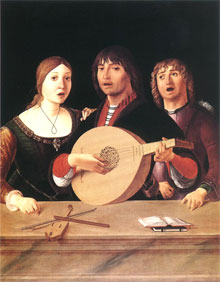Medieval Musicians
The Medieval musicians influenced the community development with the message of their creations. The northern Bard, or Skald, accompanied by his harp, celebrated the ancient gods and heroes of the people, while in the South of Europe, the troubadours were masters of courtly love and poems glorifying the courage of the knights.
However, the Medieval musicians did not have an easy life, and in the early age of minstrelsy they were denied the protection of law and condemned by the Church as having no hope for salvation.

Medieval Concert
by Lorenzo Costa
The musicians trade and the Medieval Church
The attitude of the Medieval Church towards the musicians resulted from their association with profane music, and from the fact that their performances contained, besides music, acts of physical dexterity. The way entertainers were using their bodies while performing, the contortions, the acrobatics, the use of masks, all these were considered by the clergy as being obscene and putting the body of the musician to shame. These were the times when the members of the trade were mainly named jongleurs, and had no social status.
The only chance the Medieval musicians had was to change the focus of their performances from bodily movement towards the musical aspects. Some took it earlier than others, and for a while, the jongleurs proper and the future minstrels coexisted. The moral status of musicians was analyzed in the works of many theologians. As Peter Cantor said, if these people sing with instruments, and give relaxation, or even information to their audience, then they are useful and not to be blamed. Their salvation might come if they give up the bodily part of their performances and focus only on what can improve the spiritual and intellectual condition of the public, like heroic songs. The courage and high morality of the chanson de geste heroes can inspire the youths to follow their example, thus making the society better.
The greatest help came from Thomas Aquinas, who, inspired by the works of Aristotle on civil society, demonstrated that the jongleur’s profession was not only legitimate, but necessary.
By their skill, which ultimately was the most important criteria in evaluating their role, the Medieval musicians managed to gain the favor of those who at first oppressed them, and eventually they were allowed to perform even in churches. In 1321 the musicians of Paris were granted the right to form their own Guild, thus being officially recognized as members of the skilled trade of minstrels. The Guild of royal minstrels was organized in England in 1469.
Once they organized themselves, the minstrels were soon able to engage in civic life through funding and construction of buildings. This was not the only way in which the musicians helped the Medieval society. The members of the Guild took part in civic festivals and productions of sacred and secular drama, bringing the community together.
Medieval musicians names
The Medieval musicians had different names according to the country they were living in. They were named trobadores in Spain, troubadours and trouvères in France, minstrels in England, and minnesingers in Germany.
Minstrel was the generic title of the grand profession of musicians. As the duties of the minstrels became more varied, they were associated with different individuals bearing different names, as chanteurs, conteurs, jongleurs, jestours, troubadours and trouvères. Of these, the trouvères were also the composers of the songs which they sang, while the jongleurs and the chanteurs used the compositions of others.
Besides the term minstrel, the older names covering the same type of musicians were the old English term gleemen and jugglers or jongleurs.
Gleemen were the harpers, sometimes accompanied by female vocalists and dancers called glee-maidens. The gleeman entertained the host and his guests during their meals in the hall. In winter time he was indispensable, as he was not only singing, but he also performed feats of dexterity as a juggler or jongleur.
Among the musicians of the Middle Ages, the jongleurs were famous for playing the vielle, and accompanying the songs of the trouvères. The vielle was a stringed instrument sounded by the turning of a wheel.
The jongleurs were employed by the troubadours in the same way that kings of later years employed jesters and court fools for their talents to astonish and amuse. The jongleur received a stipulated wage, and, in return, he held himself and his talents at the disposal of the troubadour.
It appears that the jongleurs’ main musical proficiency was playing the instruments, as there are not many records praising their vocal performances. However, their skills in playing instrumental music were very high, which entitle them to their own distinct position in the history of music. Working in a very competitive field, the Medieval musician was ambitious to play as many instruments as possible, and to play them well. The highly rated musicians had to meet the following requirements: to play the largest number of instruments, to exhibit the greatest versatility of style during their musical performances, and to be highly amusing and entertaining.
The harper of the Middle Ages was the most distinguished among the musicians craft. He was the reciter, and often the composer, of heroic and historical poems, of romance and love songs.
The strolling minstrels were also employed by the troubadours and minnesingers as instrumental accompanists, the proficiency of these musicians in playing the rota, rebeck, lute, and fife often being above that of their masters. Their skills greatly influenced the development of musical taste in the Middle Ages.
The German musicians, the minnesingers, abandoned to some extent the courtly songs of the troubadours, and adopted the subjects considered nearer to the people’s hearts, giving to poetry more feeling and an elevated tone. Many of their beautiful compositions embraced moral, religious, and poetical topics. Unlike the troubadours, the creations of these Medieval musicians were often improvised, and those who mastered these type of compositions were named meistersingers.
